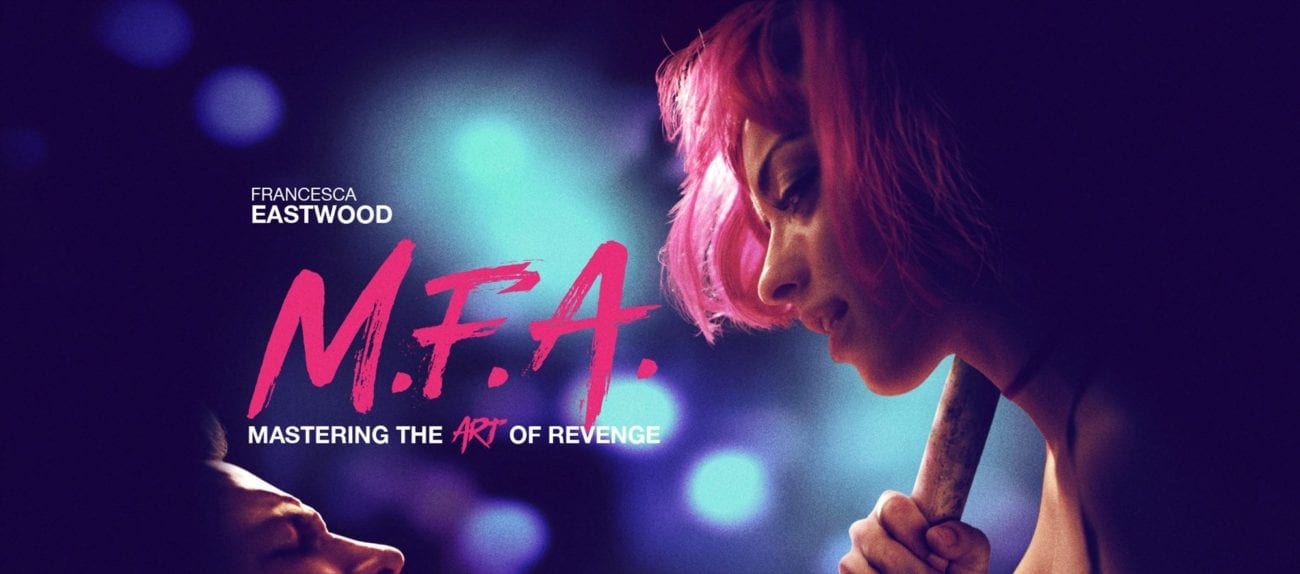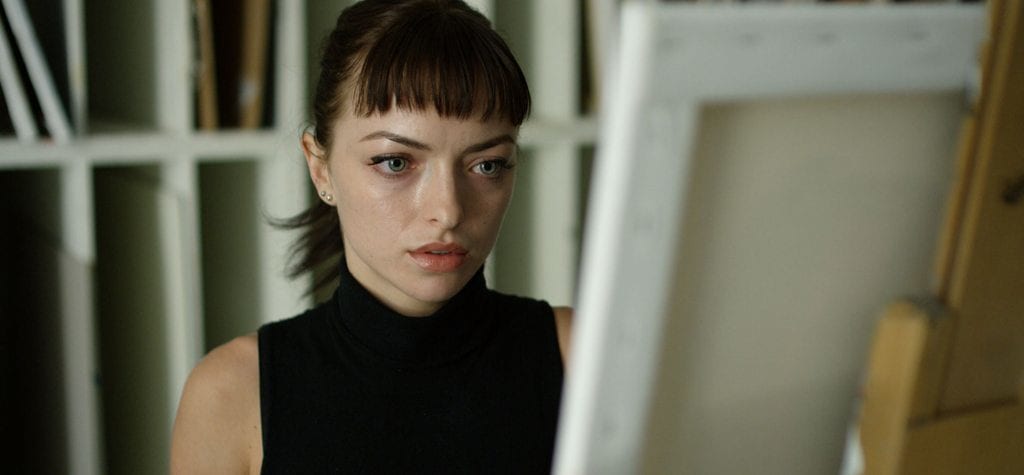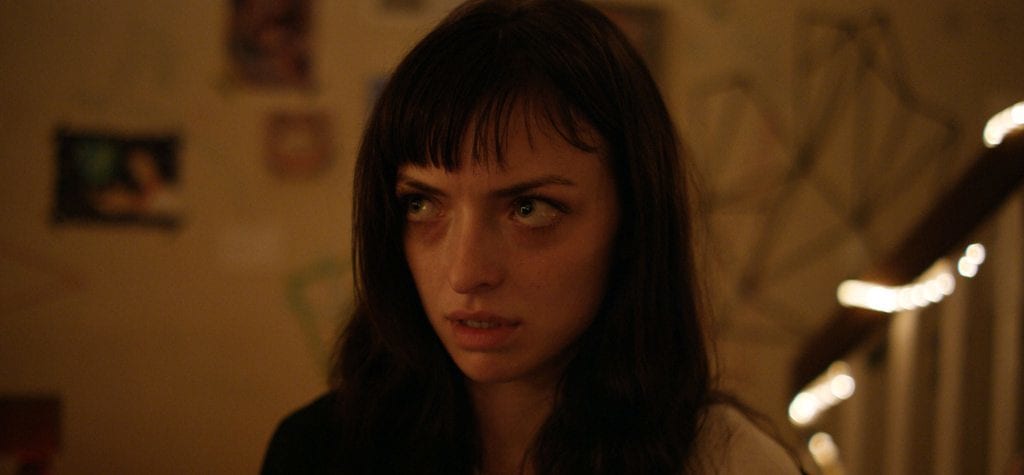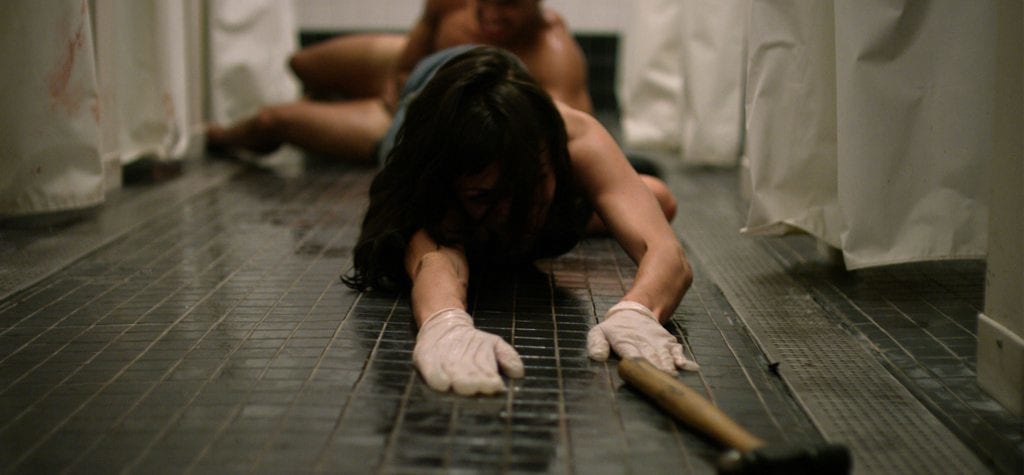
How Natalia Leite’s ‘M.F.A.’ manifests the horrors of #MeToo
With a timely 2017 release saddling the movie with controversy (as it turns out some people didn’t take kindly to a female rape survivor reaping savage revenge against violent frat boys), M.F.A. announced a shift in how horror movies could be told. Featuring a refreshing female gaze, a distinct lack of sensationalism, and a rape scene that substituted exploitation for realism, the movie highlighted the horror of sexual assault on a raw & intimate level.
M.F.A. follows Noelle (Francesca Eastwood) – an art student brutally raped by a potential love interest – who takes justice into her own hands after being failed by the system. Made long before the #MeToo movement encouraged individuals to share their stories, name their assailants, and take a step up against the often silent ubiquity of rape, the movie reflects the simmering social anxieties surrounding the issue.
While exploring the violent path of its morally ambiguous female lead, M.F.A. taps into many of the fears currently rising against women in society (they’re all just extremists trying to ruin the lives of men the world over, right?). At a time of such social divisiveness, and a time where female filmmakers are emerging with some of the best modern movies within the horror genre, we caught up with M.F.A. director Natalia Leite to discuss the making of the movie, whether women are allowed to do bad things, and where the horror genre is headed.

Film Daily: It feels like a lot of female-led narratives (not just horror) anticipated the #MeToo movement and the current post-Weinstein social climate far in advance. Did you have a sense something was changing when you made M.F.A.?
Natalia Leite: Honestly, no. I could never have predicted it when everything happened last October. But I was very aware of what was happening in schools and the Stanford (Brock Turner) case appearing in America, which was highly publicized. I was paying a lot of attention to the rape cases in universities where the perpetrators were not being penalized for their actions, and that was sort of the impetus to wanna make this movie.
But there was a definite shift – I just couldn’t have predicted it would happen so dramatically. There’s actually a great book by Rebecca Solnit called Hope in the Dark I was reading a couple of years ago. It talks about social change and how there’s this thing happening in dark corners that no one’s really seeing – it’s just sort of bubbling away and then suddenly it’ll burst.
Looking back, I feel like that’s probably what happened here. There are these different pockets of people having this conversation and trying to do something. Then suddenly a spark happened and everything lit on fire. And that’s amazing – we can’t forget we have that power. It might be just five people meeting up and talking about social issues, but it can actually have a trickle effect and create really big change.
M.F.A. is such an elegant horror movie – it’s a terrific drama but it’s also terrifying. Do you think horror is becoming more grounded in reality? And what do you think that says about modern society?
For M.F.A., I was making a really conscious choice not to exploit the violence in the movie. Obviously there’s violence, but I didn’t want to make it super gory and I didn’t want for it to overpower the sexual violence. The physical violence of her going out and killing the guys shouldn’t have overpowered the sexual violence because, for me, the ultimate horror is being raped.
I wanted for people to realize, “this is so hard to watch and so terrifying,” that it makes everything else seem like less of a big deal. That’s something people don’t talk about with horror films – that sexual violence is a terrifying, horrific thing. That’s the mindset that I went into it with, as I wanted it to be more of a struggle for her.
I do think horror movies are more grounded now. All around the world and especially now in America too, we live in terrifying times with a lot of uncertainty about the future, not knowing what’s real and what’s not real. Definitely the psychology of that is interesting to me.

M.F.A. received a fair bit of controversy when it was released. Yet, there have been so many revenge movies made about middle-aged men in recent years seeking vengeance for a wife or daughter who has been kidnapped, murdered, or raped. While they tend to have higher body counts than in M.F.A., they haven’t courted controversy in the same way at all. Are women not allowed to do bad things in movies? How do you feel about this?
I know! You have no idea – it was so surprising to me too. At a few of our screenings and in festivals some people have been like, “But did she really have to kill them?” Like, don’t you get it? She wasn’t getting any support from the system! I’m not like pro go-kill-guys, but you see men doing bad things in films all the time and we love them. We’re on their side. There are so many examples in feature films where men do bad things and we root for them. How is this any different?
It’s hard for people because they’re not used to seeing women doing these things and it messes with their morals. It’s like, “I don’t know if I want to support her because she’s going off and killing people,” but she was horrifically raped and the guys are really bad.
I focused so much on that rape scene. I was having nightmares about it just because I wanted it to be so good and do justice for the film, so audiences could understand how horrible these men are. We see bad guys or bad people die in films all the time and it doesn’t faze us as much. But for some reason rape feels – to a lot of people – a little bit ambiguous in terms of how bad of a crime it is. I wanted to make sure people knew it’s a horrible crime. Yes, there are different scales and maybe for some people there were blurred lines, but in most cases someone is traumatized because it’s extremely violent and horrible. We have to acknowledge how severe that is.
One of the scariest aspects of M.F.A. is how Noelle’s rage and frustrations become murderous. A lot of rape survivors can sadly relate to those frustrations and that rage, so it was terrifying to see someone violently acting on those feelings. Did you intend for M.F.A. to tap into the fear of that rage?
For sure. Because I think as women we’re raised to be polite and to not feel certain things or act out, otherwise you’re “psychotic” and “a bitch”, and these are the sort of labels everyone wants to avoid. You can’t be strong and be enraged, you know? But we’re human, so of course if someone commits horrible injustice towards us we want revenge, we are angry, and we are exasperated. I think that’s a good purpose for why movies are out in the world – so we can at least go through this emotional journey in a safe way.
I’m very interested in the idea of tapping into the dark sides of humanity and exploring how having these dark feelings doesn’t mean you’re a bad person. It’s actually healthy to have these feelings and to go there, so long as you’re not hurting other people.
There was a really subtle moment in M.F.A. where Noelle is rushing through the school and there’s an announcement about an enforced curfew. That curfew only happens because straight men are suddenly being attacked, while the rape of women remains willfully ignored. Is M.F.A. almost a cautionary tale about what can happen if rape accusations continue to be systematically disregarded?
I guess so, yeah. Something has to change. Women aren’t going to all go out and kill men, which is what a lot of white men are currently really upset about happening. White men are suddenly not feeling powerful anymore. I see this in Hollywood too – white men complaining that it’s harder to get a job now because everyone wants diversity. But do you know what? Stand in line, because we’ve all been waiting for a long time now.
It’s enraging a lot of men in the world. The mask has been taken off the system, we know it’s not working, and we’re taking matters into our own hands. What are we going to do about it? I think that’s the one positive thing that’s come out of this Trump Presidency – it’s made people come together and show what they stand for. I can’t sugar coat it anymore because this is the world we’re living in.

The rape scene and Noelle’s behavior immediately afterwards was done so well, but it couldn’t have been an easy scene to shoot. Could you tell us a little bit about the process of how you shot it?
For me it’s a lot about building trust with the actors. Peter Vack & Francesca Eastwood – who were shooting that scene – spent a lot of time talking about it and making sure we felt comfortable with each other. We did it in a totally closed set so we could build trust and Francesca had the freedom & space to say what was and wasn’t okay.
I had watched a lot of rape scenes in other movies too and I thought about how I was going to do it. There was a version where we didn’t really show that much and we kind of imply that it happened. We had to decide exactly what we were going to focus on. I decided that I wanted to make it feel like one long take and have the camera in her face.
I’ve seen a lot of rape movies where you see the guy spreading her legs and thrusting his pelvis, and it becomes almost pornographic. You can deconstruct some rape scenes and some of them are so sexualized. So I thought the camera should be with her and understand what she’s going through. I purposefully didn’t shoot him being in her face. We see him in the background and she just grips on for dear life. I felt like that was the most effective way to do it. I wanted it to feel very raw and emotional.
There’s been a wonderful rise in female horror filmmakers in the past few years and as a result, we’re seeing a change in the perspectives and narratives being told. Moving forward, what do you hope to see happen in horror?
I hope there are a lot more women who feel empowered to go into this genre. It’s a fact that there’s not a lot of us doing these types of films. I’m not sure if that’s because we don’t get the support or if women (maybe through culture and history) are told not to go down that dark space. I find it so refreshing to see women making horror films because it is a different point of view.
I think women are a lot more in touch with their psyche – I’m not really making a gender commentary, I just know it’s a lot more psychological and tension is built in a different way when there’s a female gaze behind it. I find that really fascinating and there’s a lot of room for exploration, especially with female protagonists who are doing morally ambiguous things. We can side with people who have complicated histories and it’s not so black & white.
We’ve seen so many films of women being helpless, or running away, or it’s the psychotic woman trope where she’s unhinged and killing everyone. There’s no subtlety, so I think we have such a good space for exploration right now.
I’ve been writing other stories too. We’ll see what happens because I’m pitching on a bunch of stuff right now, but I’m really interested in body horror for telling a female story that is sexual but also grotesque. I’m also interested in female survivalist stories – to see women just go out there and survive difficult situations would be really cool. You don’t get to see women with their faces all messy, hair in the dirt, just killing it. I would love to see that!
There’s so much social anxiety right now too with everything happening politically; it’s something on my mind a lot. What kind of a future are we building? And how would we respond to extreme situations, ones where we’re called to be in survival mode? I’m excited to build on these ideas and use them for future stories.
This interview has been edited and condensed for clarity.




